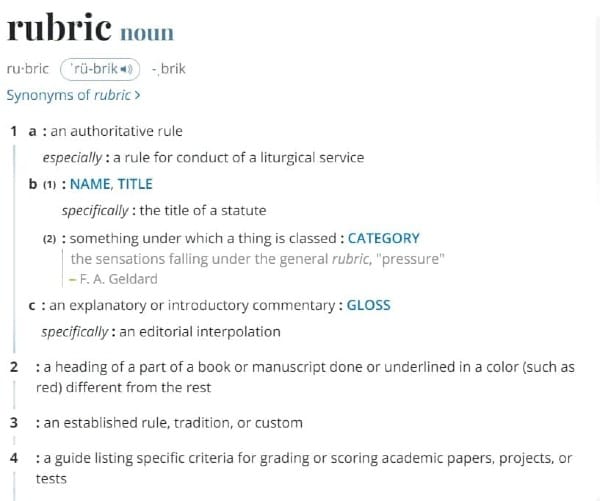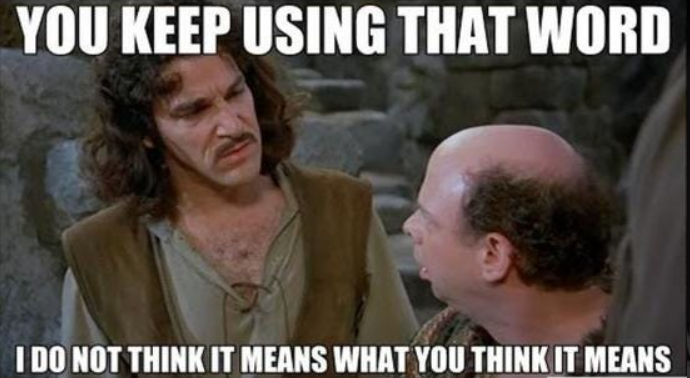Dissertating about Jargon with Alex Shevrin Venet

Discourse about K-12 education requires words—so many, many words and most with loosely agreed-upon definitions that can vary from person to person, educator to educator. Take, as a benign example, definition #4 for the word rubric.

I'm currently reading Kory Stamper's wonderful book Word by Word, which digs deep into how definition-writing is much more complicated than one would think and wouldn't presume to offer my own. I do, though, feel comfortable saying it's not wrong, but also, it's not exactly right. Their definition sounds more like a checklist ("listing specific criteria") and rubrics aren't about grading or scoring—they're about communicating expectations of quality. The definition of rubric, though, is fairly meaningless outside professional development contexts.
There was a time, early in my involvement in the education discourse when I would gleefully march into the mentions of someone who had shared a document they called a rubric that clearly wasn't one and tell them so. It was very, "that's not a rubric, this is a rubric." It was a fairly ineffective approach and thankfully, I learned that lesson pretty quickly. Though probably not as quickly as I should have.
At the risk of overusing pop culture references that make my generational affinity, there are days when I deeply feel Inigo Montoya's bafflement and frustration.

Rather than continue to navel gaze, I wanted to talk to someone about it. Alex Shevrin Venet, is the author of two books about trauma-informed practices and I know from being a part of her second book’s journey from idea to publication, that she is incredibly thoughtful about words. She don’t use terms lightly, she helps the reader understand concepts she explores, and offer lots of examples and specifics of what trauma-informed is and isn’t. She don’t offer it as a panacea or use it to diminish academics or the other goals of schools.
My question to her below are in italics.
One of the many challenges in education, and elsewhere, is that on a frustratingly regular basis, terms that are developed in academia or with a specific meaning in specific contexts are taken by publishers or bad actors and used out of context in a way it’s not meant to be used. CRT went through that cycle and now, trauma-informed is mid-way through. I’d love to hear your thoughts about how the term is being used.
Unlike CRT, “trauma-informed education” has never actually meant one specific thing. I sometimes say this is a good thing, in part, because it means that no one “owns” trauma-informed practice and therefore it’s not at the whim of a specific company that’s making money off trauma-informed curriculum, for example. At the same time, it means that there’s not a lot of agreement about what the term means or what it looks like. So to see people making up their own definitions of “trauma-informed” in the discourse is not surprising at all to me, and I can’t necessarily fault them for it because even within the field, we don’t agree. For example, I strongly believe that it’s not trauma-informed to have police in schools, while at the same time, one of the biggest names in trauma-informed education advocates for collaborating with SROs as part of a trauma-informed approach. So when I see people take to the internet streets to blame trauma-informed education for all manner of problems, I kinda get it. That’s part of why I’m trying to be out there defining trauma-informed education in an equity-focused way, to try to re-center justice in the narrative.
In my experience as a reader, one of the hardest things to negotiate with the concept of trauma-informed practices is the messaging I picked up around “trauma” being this really big bad thing that makes it impossible to live a healthy and/or routine, safe, happy life (I blame Grey’s Anatomy.) My understanding of your book is that it does not provide an accurate understanding of the concept. Is there something in particular you’d like educators to think of or consider when they hear the word or phrase?
So, similarly to how “trauma-informed” doesn’t mean just one thing, “trauma” also doesn’t mean just one thing. Ask a therapist, a neuroscientist, and a doctor to define trauma and you’ll get at least three different answers. Some people want to use the word “trauma” to refer to how we respond to only the most extreme of circumstances, but there’s something really icky about trying to determine where, exactly, the line between “extreme” and “not extreme” lies.
I really love how blogger Crys Tom put it: “We lose nothing by allowing the concept to be a bit fuzzy, inviting, trusting, and compassionate along the edges.” That’s where I come down, too: allowing “trauma” to be a bit fuzzy at the edges. Trauma is a response to events, not the events themselves, and it’s really not up to me to decide whether an event was life-threatening/dangerous/stressful enough for you to cause trauma to you.
Similarly, lots of folks connect the impacts of trauma to what we see in the media and the outline of symptoms in the DSM. But what I’ve learned from working with people who experience trauma, studying the literature on trauma, and experiencing trauma myself: it just looks different for different people and in different situations. Sometimes trauma does look like a complete inability to function. But it can also look like a constellation of different impacts, ranging from super challenging to positive or even life-giving. (Interestingly, though, the research on “post traumatic growth” says that you don’t get to have the growth without also having the stress, so it’s not a simple matter of “what doesn’t kill us makes us stronger”).
Grey’s Anatomy is actually a better example than you’d think. Almost every character on that show has experienced significant life threatening, dangerous, and stressful events that may cause trauma. We see those characters melt down, freak out, hurt each other - but we also see them performing their jobs competently, having fulfilling relationships, and finding meaning in work and life. In other words, they’re just people. Which brings me around to what I want teachers to know about trauma: trauma isn’t something that makes one student into a new breed of person that should be treated differently from all the rest. It’s part of what makes us human, and so knowing more about trauma should encourage us to be more human together.
Doctors and nurses have the Physicians’ Desk Reference. Psychologists and therapists use the DSM-5. Lawyers have a Glossary of Legal Terms. Teachers have Google. We do not have a common language in K-12 education, which makes it harder to find common ground, as it were. In your experience as someone who is an expert in a particular concept and has seen the name of that concept misused or misrepresented, do you have any thoughts on how to get better at talking to each other without asking everyone to define every jargon-y term?
This is the million-dollar question, isn’t it? I think maybe it’s less about the terms and more about a set of shared values and shared purpose. For example, even if we agree about the definition of trauma, we might have very different ideas about why teachers should care about it as a concept. Some people want to talk about trauma because they see it as a barrier to academic achievement, which is the primary goal for schools.
I want to talk about trauma because it’s part of the human experience and I think schools should be concerned with caring for humans. So maybe our path to getting on the same page (or recognizing when we’re not on the same page at all) is to be curious about one another’s goals and beliefs about what school is for.
At the very least, understanding these things helps me recognize when I’m just not even having the same conversation as someone else. For example, there’s a teacher on twitter who cares a lot about the so-called literary canon. I’ve seen enough of his tweets to know that he envisions a very different purpose for school than I do. I know we are not having the same conversation about school, so I’m not going to be too concerned when he defines trauma-informed education in a radically different way than me. We aren’t ever going to get on the same page because it’s apples and oranges. To get better at talking to other people, sometimes I need to recognize when a conversation is not worth having in a particular situation, and maybe seek out other places to amplify my message with folks who are ready to hear it.
I absolutely get that. I’m particularly wondering about correcting the message that you’re asking people to be therapists. That is, comments like this “maybe deputizing teachers into pseudo-therapeutic roles and asking them to deal with deep trauma and volatile emotions isn’t the best idea?” The person who said that isn’t likely to change their mind. However, parents may hear teachers are using trauma-informed practices and think “therapy” or “my kid isn’t traumatized.” Advice on how to add clarity or clear up confusion?
Great Q! I actually wrote about this in some depth here. Tl;dr: “trauma-informed” refers to practices we use proactively, for all students/people, with a focus on changing practices and environment in a school. You don’t need to have experienced trauma to benefit from trauma-informed practices. In fact, you can be trauma-informed without ever discussing trauma directly with your students. For example, I recently made a post on Instagram about trauma-informed attention getters. If you’re trauma-informed, you’re informed by your understanding of trauma, in this case the fact that many people experiencing trauma have a heightened startle response. Therefore, for the whole class, you might choose an attention-getter that is less likely to startle students - for example, instead of an airhorn sound effect on your phone, using a chime. Instead of flickering the lights on and off, using a call and response with the class. See? No inappropriate conversations necessary to be trauma-informed in that moment!
Within a trauma-informed environment, some people still need trauma-specific interventions, such as counseling. In the article linked above, I specify that teachers should not be the ones leading trauma-specific interventions, because that is not our role, we are not trained for it, and we can do harm by attempting to do things like delve into past trauma with students or suggest therapeutic interventions. Boundaries are actually really important in trauma-informed (and trauma-specific) work!
What do you see as advantages to the current level of discourse around teachers and teaching? Disadvantages?
I’ve seen teachers recently involved in discussions of systemic-level issues in ways that I previously hadn’t seen, and that feels hopeful. The more that teachers are using their voices to talk about the conditions they need to be successful, the better. At the same time, there’s an intense level of teacher-blaming around everything from literacy to youth mental health. I’m mourning the decline of Twitter because it gave an outlet for teachers to push back on these kinds of “think pieces” and add their own commentary and experiences, in a way that other social media make more difficult.
Blaming teachers is almost a competitive sport these days. One of the things I appreciated about your book is how you offer those who work in schools ways to think through and negotiate issues on the individual and systemic-level. Where’s the best place for people to order a copy? Connect with you?
Thanks Jenn! You can find info about both of my books here, although I encourage folks to order your copy through your local independent bookstore! To connect, I am still on The Site Formerly Known as Twitter for now at @AlexSVenet, and you can also find me on Instagram at @UnconditionalLearning and Facebook at Alex Shevrin Venet.
A donation has been made to World Central Kitchen in gratitude for Alex's time.